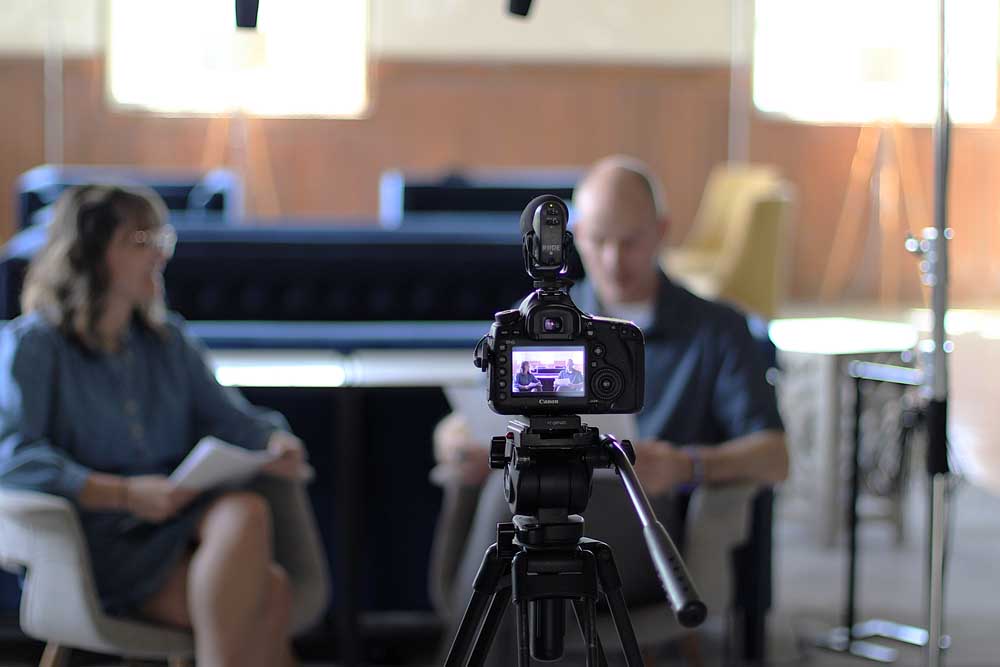Through new podcast, East Texas organizations unite to raise awareness on domestic violence and sexual assault
Published 5:45 am Monday, April 7, 2025

- The Women’s Center of East Texas and East Texas Crisis Center collaborate on a new podcast, aiming to raise awareness about domestic violence and sexual assault. (Jennifer Scott/Tyler Morning Telegraph)
With the shared goal of raising awareness and fostering community discussions on sensitive issues, the Women’s Center of East Texas and the East Texas Crisis Center have teamed up for a new podcast addressing domestic violence and sexual assault.
“We decided to work together for this podcast project as a way to raise awareness, educate the community, and have difficult discussions that survivors face in meeting and getting support,” said Jeremy Flowers, Director of Coordinated Community Response for the East Texas Crisis Center.
Titled ‘Barrier Breakers: Building Communities and Connecting the Dots,’ the podcast sheds light on intimate partner violence and sexual assault through thoughtful and informed content.
“We’re connecting dots to fill in gaps in our community, with a focus on prioritizing survivor safety, support, and taking a collective approach to ending violence in our 11-county service area,” said Flowers.
Located in Tyler, the East Texas Crisis Center offers safety, shelter, counseling, advocacy, and education to survivors of family violence, dating violence, sexual assault, and other violent crimes in Smith, Wood, Rains, Henderson, and Van Zandt counties.
The Women’s Center of East Texas, based in Longview, provides vital support for survivors of domestic violence, sexual assault, and sex trafficking in Gregg, Harrison, Upshur, Marion, Rusk, and Panola counties. Their free services include emergency shelter, transitional housing, a 24-hour crisis hotline, legal advocacy, and counseling, empowering survivors and advocating for societal change.
“Awareness and education are the first steps toward change,” Flowers said. “The more we raise awareness and educate society, the more we can normalize what are often considered taboo subjects that can be difficult to talk about. The more we work toward the normalization of domestic violence and sexual assault, the more effectively we can address these issues, meet the needs of survivors, and reduce violence in our communities.”
Nell Spencer, Director of Outreach and Education at the Women’s Center, emphasized the unity between the two organizations. “We are two organizations coming together to try to end domestic violence. It’s important that we’re not competing with each other, but collaborating for the good of the movement.”
Since the end of January, the organizations have been meeting twice a month in Kilgore to record the podcast. The team is still adjusting and working through initial challenges, focusing on building rapport and establishing a cohesive dynamic. They also aim to bring guests into the discussions as the podcast evolves.
“We want to bring other folks in because it’s important to involve the community in these discussions,” Flowers said. “This is a community-driven issue, both in meeting needs and reducing violence in the community.”
February was Teen Dating Violence Awareness Month, and one of the podcasts focused on raising awareness about teen dating violence and promoting healthy relationships.
“We talked about the cycle of abuse and how it can be generational and familial,” Spencer said. “A lot of times, people don’t want to acknowledge that what’s happening in their home is creating a system of abuse. It touches the lives of everyone that child comes into contact with — at school, during after-school activities, and while playing sports. It’s not something that will change unless the public becomes aware and steps in.”
The podcast also touches on how shame and normalization of abuse can prevent people from talking about it, especially when someone comes from a family with a history of abuse.
“Those behaviors can seem normal, and you may not know there’s a different way to do things,” Spencer said. “But often, a survivor will leave and come back, and the statistic is that they’ll do this seven to nine times. After a few times, they might feel like they’ve burned bridges. The abuser may have isolated them, and then there’s the shame they have to overcome, thinking it’s their fault. But it’s never the survivor’s fault; it’s always a choice the abuser is making.”
The podcast also aims to keep the community informed about relevant legislative developments, including key bills from the 89th Legislative Session. Notable proposals include SB 761, which focuses on enforcing crime victims’ rights, SB 615, which seeks to eliminate the statute of limitations for adult sexual assault survivors, and SB 836, which aims to protect survivors’ privacy. Additionally, HB 1332 looks to update the Education Code to require school districts to include teen dating violence in their improvement plans.
“Education is the key to change,” Spencer said. “And if we are trying to change our society, we have to educate people on what it looks like, what it sounds like, what it feels like, and educate people on having the hard conversations.”
To listen and watch the podcast, visit www.youtube.com/@BarrierBreakers1. It is recorded by Chip Hale, executive director of REEL East Texas.
“I’m really excited for the opportunity to collaborate on this project with Nell,” Flowers said. “We’re both passionate about what we do, and we truly aspire to address these issues head-on. We want to work with others in our 11-county service area to have these difficult conversations, raise awareness, and help educate the community so that we can break barriers and connect the dots.”
For more information, visit etcc.org (East Texas Crisis Center) or www.wc-et.org (Women’s Center of East Texas), or call the 24-hour hotline at 800-441-5555.

